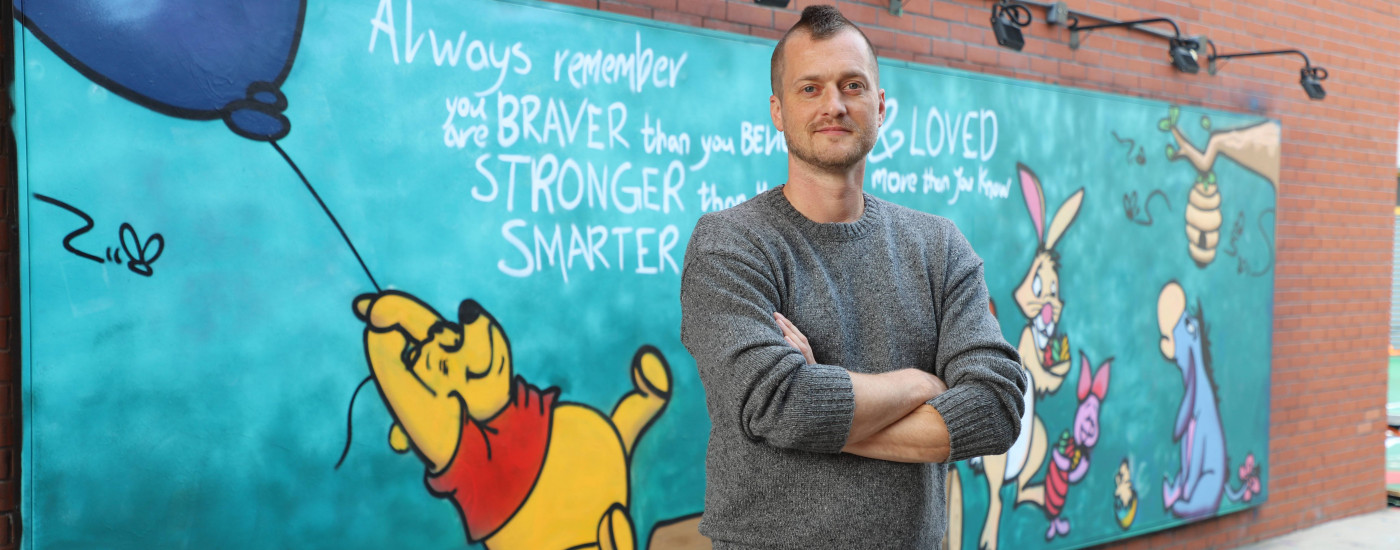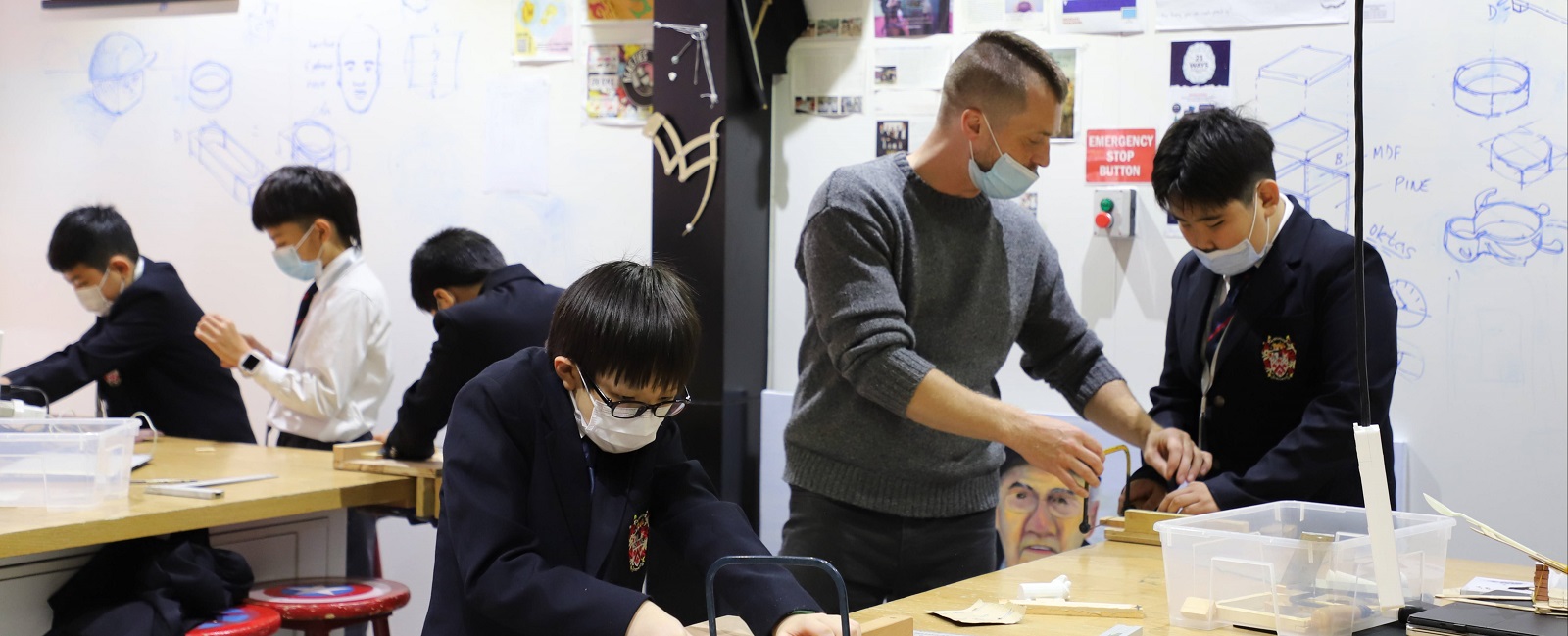A Coffee Chat with Andrew Walton

Already a busy Art and Design Technology teacher at Dulwich College Beijing (DCB), Andrew Walton has added another responsibility to his teaching portfolio. Meet our recently appointed Senior School Sustainability Coordinator and read about his plans to drive sustainability literacy and engagement across the community.
Tell us more about your mission
As the Senior School Sustainability Coordinator, the most important thing I can do is to connect and inspire people to care, then take action.
One of my key goals this year is to increase the amount of empathy we have as a school community. If our community of students, parents and teachers is given authentic opportunities to learn and understand more about the wide range of issues we are facing, we will be that much more likely to care about them, and therefore be much more likely to act.
The Sustainable Development Goals (SDGs) can be understood as global issues which have been individually broken down into smaller targets which we can use to identify local actions that could accumulate and positively impact the broader global problems.
What’s your approach to address the 17 SDGs?
We are aware of the broad and complex nature of the SDGs. In Senior School this year, we will highlight two goals per semester and build up the community’s literacy around these topics. Over time, we will gradually introduce more of the Goals, more of the issues, and ultimately, bring in more of the solutions. Our first two Goals are 5: Gender equality and 15: Life on Land.
Most of these problems have built up over time - from a lot of people doing small things that have accumulated into greater issues. So, we can also assume that the solutions be similarly compounded, with local communities taking small actions building towards larger movements.
Following Mr Lunn’s Teaspoons of Change approach, we want everyone to take small steps so that collectively we can make an impact. We are therefore encouraging everyone in our community to do 10% more in any field they are already passionate about, and individually answer to the questions: “What’s your 10%? What can you do to make things better?”
We are calling for students, parents and teachers to volunteer as advocates for each of the goals. We know we have experienced and engaged parents in these fields and invite them to share what they are doing to inspire other parents, students and teachers through their contributions.

How would you define sustainability?
The 1987 United Nations Brundtland Commission defined sustainability as "meeting the needs of the present generation without compromising the ability of future generations to meet their needs". This means we need to do things in a smart way, both for us today and for the future. It doesn’t mean everything is entirely ecologically focused. Some goals are primarily social in nature, though of course, some environmental goals have a social impact as well and vice versa. Understanding that each of the Goals is extremely complicated and that they are interconnected surely helps to deepen our understanding and reflect on the complexity of the issues.
How do you position sustainability in a context students can relate to?
We take a tiered approach to introducing the Sustainable Development Goals (Global Goals) across the whole College. Every topic is addressed with different levels of complexity and age-appropriate delivery of information. Early Years learn about the Good Life Goals, a simplified version of the SDGs, and Junior Skills step these up to Sustainable Development Goals (https://sdgs.un.org/goals ). As such, by the time these students get to Senior School, they are looking at the more complex end of the same issues.
In Early Years, gender equality may be as simple as playing together with friends without any gender differences consideration and only bearing in mind that everybody should have fair treatment. They would build upon that simple principle to Junior School and all the way up to Senior School.

As students grow older, they develop more abstract-thinking capabilities, which enable them to understand more and more complex issues. The last thing we want is to introduce very complicated issues to students too early because they can’t grasp such a level of complexity. For instance, if we talk about geopolitical issues with younger students, many may not be able to position some countries on a map, let alone understand complex issues related to governance, politics, wars, cultural differences, religions… Thus, the need for a tiered approach to building up that understanding.
We are working on identifying where the Global Goals fit in the Early Years and Junior School’s curriculums, and how they are articulated in Senior School programmes, working towards fully mapping the Global Goals across across the College. This also means assessing which topics should and could be addressed at school, when to introduce them, and at which level of complexity.
How would you guide students to integrate sustainability into their daily life?
The more embedded sustainability is in the curriculums across the College, the more opportunities students will have to integrate these topics in the back of their minds. For instance, students can learn about gender equality in their history or Global Politics courses, read about different religions, and learn about how things are interconnected. Over time, the collective mindset would shift from “sustainability is about plastic” to “sustainability is about everything that needs to happen” because ultimately, a world out of balance due to either social issues or environmental ones is unsustainable.
The complexity around sustainability also comes from our biases, and our personal set of experiences that have shaped the way we think about and see things. With more opportunities to dialogue, people will better understand, then develop more empathy and care.
How do you plan to work with teachers, students and parents?
We aim to create a slow wash of empathy over the whole school along with a progressive introduction the SDGs, a couple at a time. We also want to highlight people who are already working in the different fields. We plan to develop a physical SDG wall, a communication space that will show all 17 SDGs. Each goal will have a section to share information about the goal and its targets, how it ties to the curriculum, who advocates for it in the community, the latest local and global news about it, and an area to submit questions and suggestions.
The goal of this wall is to connect our community of students, parents and teachers, and decentralise the SDG Club so that our collective efforts result from the College’s community doing 10% more rather than relying solely on the SDG Club members. Again, we need everybody to contribute a little bit in each of the fields, starting with the things they are already passionate about.
We will also collaborate with our social-emotional counsellors and Heads of Key Stage to build up resources, discussion points, videos… to bring in that slow wash of empathy. Most importantly, we will leverage our student-led initiatives and our Year group leaders and student Service representatives. Students represent the future generation and bring in different perspectives to every problem. They may lack experience of time, but they have the drive to embrace and implement changes. Combining the maturity and connections of the parent body with the drive and out-of-the-box perspectives of our students within a framework provided by our teachers I am certain we will have a powerful impact.
To conclude…
We have been building really positive momentum over the past years. I would love to have even more parents join, connect with, and inspire other parents, teachers and students to take on some of these big issues. Let’s think globally and act locally!








